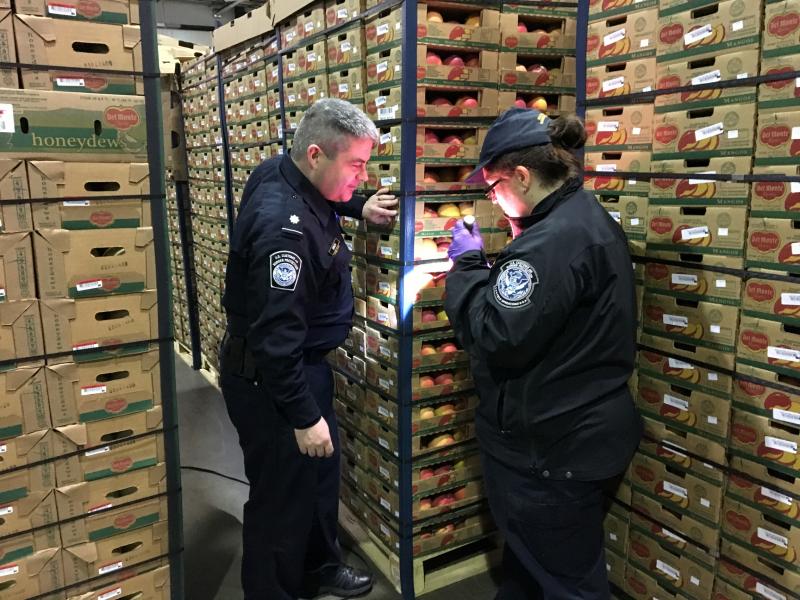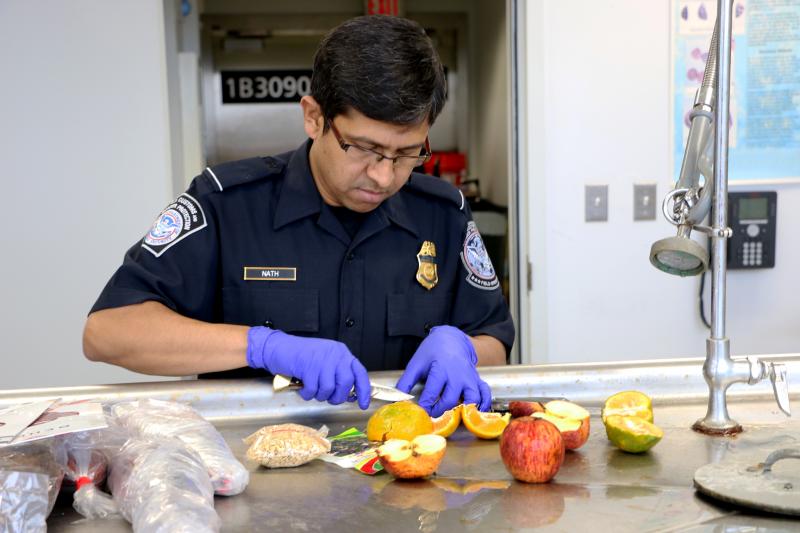BALTIMORE -- Did you know that the Area Port of Philadelphia is the #1 maritime port for perishable agriculture products in the United States?

specialists inspect mangoes in the
nation's #1 produce import ports.
The Area Port of Philadelphia, which includes the Ports of Philadelphia and Wilmington, Del., encompasses a geographic range of approximately 1,150 square miles, including territory from Pennsylvania, Delaware and Central/Southern New Jersey. This vast area absorbs virtually countless amounts of fresh produce imports.
For example, every week, more than 27 million bunches of bananas and 6 million pineapples arrive into the Area Port of Philadelphia. These imports are destined for distribution to markets across the country.
There is no slow season, as consumer demand requires the availability of fresh produce year-round. Even when certain imports decrease, others increase. Indeed, as imports of citrus from Morocco and Spain; grapes from Peru and Chile; and plums, peaches, nectarines, and apricots from Chile are currently winding down, arrivals of apples from New Zealand, citrus from Chile and South Africa, avocado and citrus from Peru, and corn and soybean seeds from Chile and Argentina are beginning to pick up.
These shipments are massive in volume and are handled primarily by CBP agriculture specialists, who are responsible for safeguarding American agriculture while facilitating legitimate trade and travel. CBP in Philadelphia and Wilmington clear more than 73,000 cargo shipments per year of agricultural commodities.
It is a formidable task for CBP agriculture specialists to carefully inspect these imports. Their hard work and dedication is evident with each shipment that is searched and cleared. Agriculture specialists search through thousands of shipments of fruit each day, looking for the tiniest of insects; it can be like looking for a needle in a haystack.
In addition, CBP collaborates extensively with industry partners, such as the U.S. Department of Agriculture (USDA), importers, shippers, terminal operators, shipping lines, and Customs brokers to continuously develop innovative methods to efficiently clear cargo. Clearing cargo includes the review of thousands of import permits, foreign government certifications, and invoices in order to ensure that products meet import requirements.
According to the USDA, agriculture is the largest industry and employment sector in the United States, with more than $1 trillion in annual economic activity. The potential impact of a pest coming into the United States can be catastrophic. For example, invasive species cause $138 billion annually in economic and environmental losses in the United States, including yield and quality losses for America’s agriculture industry.

international travelers’ luggage for
prohibited products that might carry
dangerous hitchhiking insect pests.
CBP agriculture specialists play a critical role in the Department of Homeland Security. They are highly-trained and specialized professionals who work tirelessly, and they are constantly vigilant in targeting, detecting, and intercepting fruit and vegetable imports that may contain hidden threats, particularly pests and diseases, which can have devastating effects on both consumer safety and our nation’s economy.
“The tremendous effort by our Customs and Border Protection agriculture specialists directly influences our everyday lives by keeping destructive pests and other threats out of our country, which in turn allows consumers to enjoy these imports,” said Joseph Martella, CBP Port Director for the Area Port of Philadelphia. “It is imperative to identify and stop pests and diseases at the border before they can be spread elsewhere.”
Every year, tens of thousands of pests are intercepted by CBP agriculture specialists who identify potential threats to the health and safety of U.S. agricultural resources based on scientific risk assessment and study.
“Customs and Border Protection agriculture specialists at the Port of Philadelphia and the Port of Wilmington are the first line of defense against destructive pests entering the United States,” said Casey Owen Durst, CBP’s Field Operations Director in Baltimore. “The amount of dedication, hard work, and attention to detail is just another example of the unwavering commitment by CBP to keeping our country safe.”
On a typical day in fiscal year 2017, CBP agriculture specialists discovered 352 pests at U.S. ports of entry and 4,638 materials for quarantine.
Travelers can check the general admissibility of fruits and vegetables by consulting the Animal and Plant Health Inspection Service website or the Fruits and Vegetables Import Requirements database.

